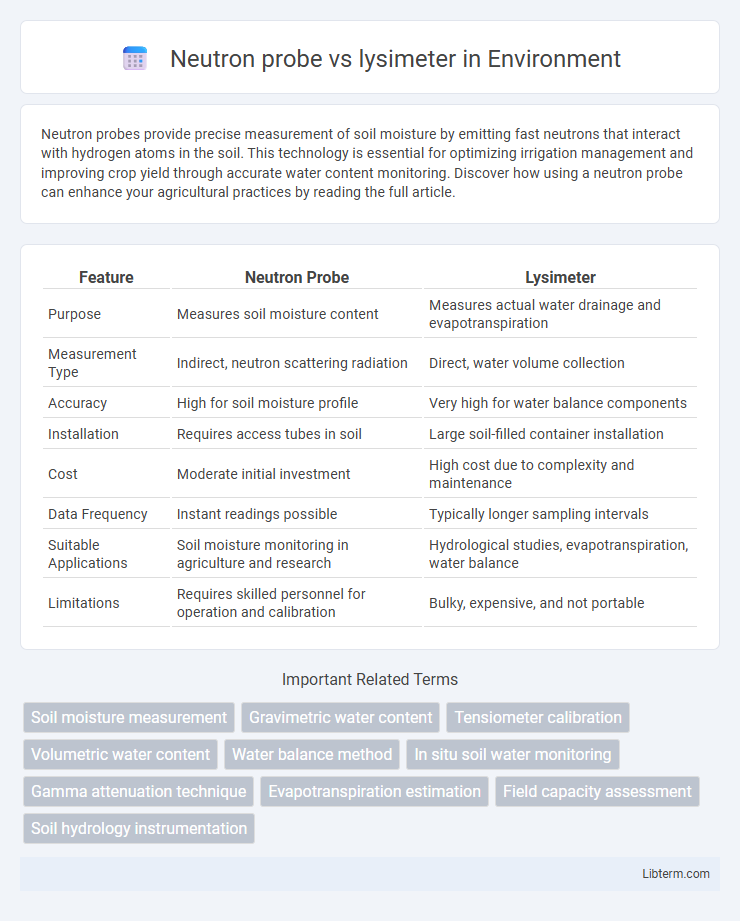Neutron probes provide precise measurement of soil moisture by emitting fast neutrons that interact with hydrogen atoms in the soil. This technology is essential for optimizing irrigation management and improving crop yield through accurate water content monitoring. Discover how using a neutron probe can enhance your agricultural practices by reading the full article.
Table of Comparison
| Feature | Neutron Probe | Lysimeter |
|---|---|---|
| Purpose | Measures soil moisture content | Measures actual water drainage and evapotranspiration |
| Measurement Type | Indirect, neutron scattering radiation | Direct, water volume collection |
| Accuracy | High for soil moisture profile | Very high for water balance components |
| Installation | Requires access tubes in soil | Large soil-filled container installation |
| Cost | Moderate initial investment | High cost due to complexity and maintenance |
| Data Frequency | Instant readings possible | Typically longer sampling intervals |
| Suitable Applications | Soil moisture monitoring in agriculture and research | Hydrological studies, evapotranspiration, water balance |
| Limitations | Requires skilled personnel for operation and calibration | Bulky, expensive, and not portable |
Introduction to Soil Moisture Measurement
Soil moisture measurement is critical for precision agriculture and hydrological studies, with neutron probes and lysimeters being prominent methods. Neutron probes estimate soil moisture by detecting hydrogen atoms through neutron scattering, offering rapid and non-destructive readings at varying depths. Lysimeters provide direct measurement by collecting and weighing percolated water, enabling precise evapotranspiration and soil water balance analysis.
Understanding Neutron Probes
Neutron probes measure soil moisture by emitting fast neutrons and detecting the slow neutrons scattered by hydrogen atoms, providing real-time, non-destructive volumetric water content data at various soil depths. In comparison, lysimeters directly measure water percolation and soil moisture by collecting drainage water, offering precise but labor-intensive and time-consuming results. Understanding neutron probes is essential for efficient soil moisture monitoring in agriculture and hydrological studies due to their rapid data acquisition and ability to sample multiple depths without disturbing the soil.
Exploring Lysimeters
Lysimeters provide precise soil water balance data by directly measuring evapotranspiration and percolation, enabling effective irrigation management and environmental monitoring. Unlike neutron probes, lysimeters capture both water input and output, offering detailed insights into plant water use and nutrient leaching. Their accuracy supports research in hydrology and soil science, especially in assessing agricultural water efficiency and groundwater recharge.
Key Principles of Operation
The neutron probe measures soil moisture by emitting fast neutrons that collide with hydrogen atoms in water, slowing down neutrons detected to estimate moisture content. Lysimeters function by collecting and measuring actual water percolating through soil, providing direct quantification of evapotranspiration and drainage. Both methods offer precise soil water data but rely on fundamentally different physical principles--neutron scattering versus gravimetric water collection.
Accuracy and Precision Comparison
Neutron probes provide rapid soil moisture measurements with high precision but may require calibration for accurate results across different soil types. Lysimeters offer highly accurate soil water content data by directly measuring water percolation and evapotranspiration, although their precision can be affected by environmental factors and installation variability. In terms of accuracy, lysimeters generally outperform neutron probes, but neutron probes excel in precision and operational efficiency for frequent monitoring.
Advantages of Neutron Probes
Neutron probes offer precise, real-time measurement of soil moisture at various depths without disturbing the soil structure, making them highly effective for dynamic irrigation management. Their ability to provide rapid, repeatable, and non-destructive data collection allows for better water resource optimization compared to lysimeters, which require extensive installation and maintenance. Neutron probes are especially advantageous in large-scale agricultural monitoring due to their portability and efficiency in diverse soil conditions.
Benefits of Lysimeters
Lysimeters offer precise measurements of soil moisture and nutrient leaching, enabling accurate water balance studies critical for agricultural and environmental research. Unlike neutron probes, lysimeters provide continuous, real-time data on soil water content and solute movement, facilitating better irrigation management and contaminant tracking. Their ability to simulate natural soil conditions and capture runoff enhances understanding of water dynamics and ecosystem health.
Limitations and Challenges
Neutron probes face limitations such as soil moisture measurement restrictions due to soil texture, salinity interference, and the need for soil calibration specific to each site. Lysimeters pose challenges including high installation and maintenance costs, potential disturbance of soil structure, and difficulties in accurately simulating natural field conditions. Both methods require careful consideration of site-specific factors to ensure reliable soil moisture data for agricultural and hydrological applications.
Applications in Agricultural Research
Neutron probes provide precise soil moisture measurements at various depths, essential for optimizing irrigation scheduling and understanding crop water uptake in agricultural research. Lysimeters allow accurate quantification of water balance components including evapotranspiration, percolation, and drainage, enabling detailed studies on nutrient leaching and water use efficiency. Both tools are critical for enhancing precision agriculture practices, improving water management, and supporting sustainable crop production systems.
Choosing the Right Method for Your Study
Selecting between a neutron probe and a lysimeter depends on study objectives, soil moisture depth, and accuracy needs; neutron probes offer rapid, non-destructive moisture profiling at multiple depths, ideal for large-scale field monitoring. Lysimeters provide precise evapotranspiration and water balance data by measuring actual water loss, best suited for detailed, plot-scale experiments demanding high accuracy. Consider site conditions, budget, and required temporal resolution to determine the optimal method for groundwater and soil moisture research.
Neutron probe Infographic

 libterm.com
libterm.com